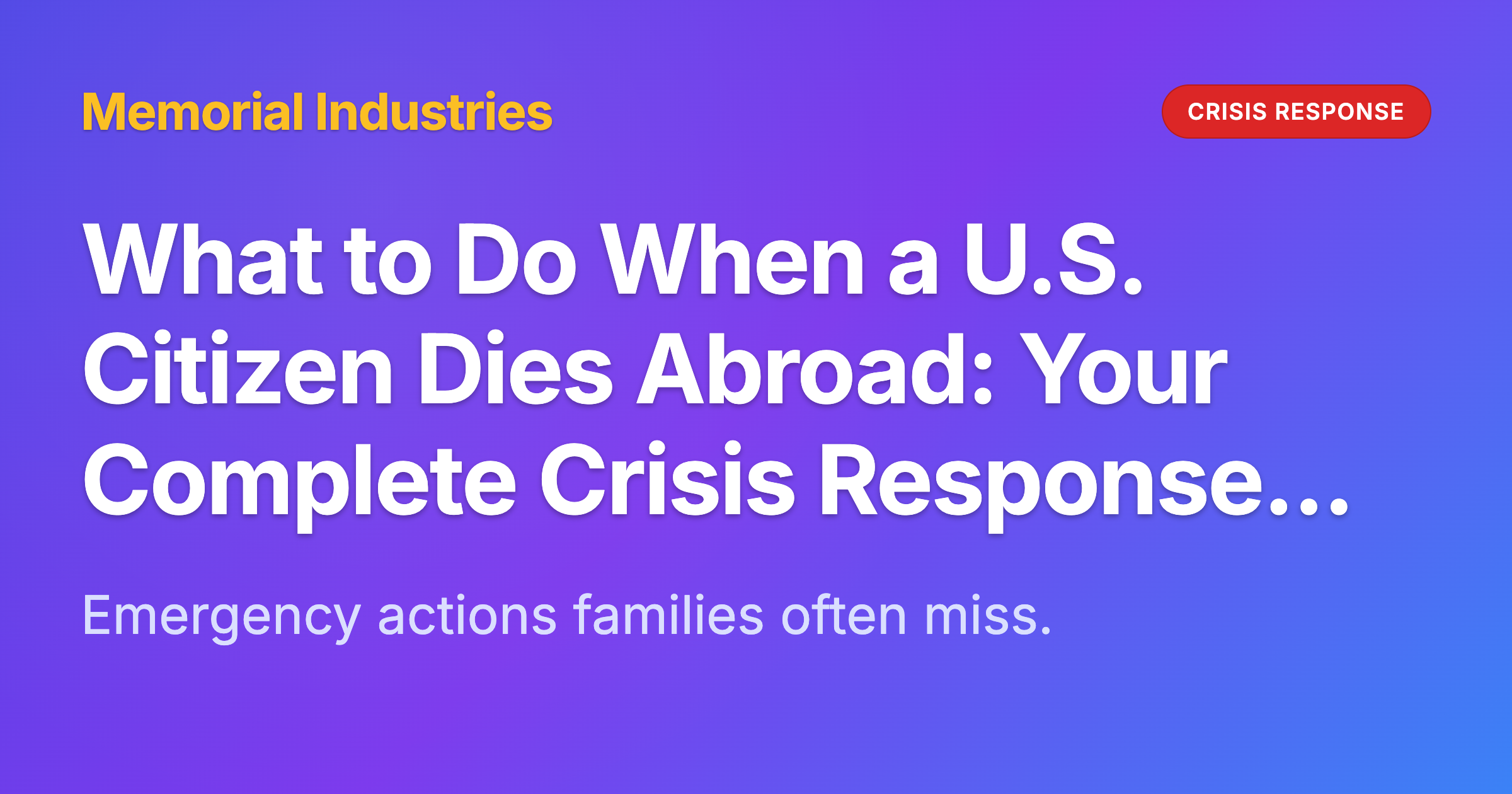
- Jan 30, 2025
- 8 min read
What to Do If a Loved One Dies Overseas: A Step-by-Step Guide
When a loved one passes away while traveling or living overseas, families face an overwhelming combination of grief and complex logistical challenges. This comprehensive guide provides the steps you need to navigate the difficult process of bringing your loved one home with dignity and respect.
The death of a family member abroad involves intricate international procedures, documentation requirements, and cultural considerations that can feel impossible to manage during your time of loss. Understanding the proper steps from the very beginning can make the difference between a smooth repatriation and weeks of painful delays.
Immediate Steps to Take in the First 24 Hours
Your immediate priority is to contact the appropriate authorities and begin the official process. Start by notifying the local police or emergency services where the death occurred, as they will initiate the official death investigation and documentation process required by local law.
Next, contact the nearest U.S. Embassy or Consulate immediately. Embassy staff are specifically trained to assist American families during international deaths and will guide you through the consular procedures required for repatriation. They can also help you understand local laws and requirements that may affect your loved one’s care.
Contact your loved one’s travel insurance provider if they had coverage, as many policies include repatriation benefits that can significantly reduce your financial burden. Document everything from the beginning - keep records of all phone calls, reference numbers, and official documents you receive.
Gathering the Required Documentation
International repatriation requires extensive official documentation that must be obtained in the correct order. The foundation document is the official death certificate issued by local authorities, which typically takes 48-72 hours to process in most countries.
You’ll need a Consular Mortuary Certificate from the U.S. Embassy or Consulate, which serves as official American government recognition of the death abroad. This document is essential for airline transport and customs clearance when entering the United States.
Additional required documents include embalming certificates, transit permits, and customs declarations. Each destination country has specific requirements, and missing even one document can result in significant delays. Professional repatriation services handle this complex documentation process to ensure nothing is overlooked.
Navigating Local Laws and Death Certificates Abroad
Every country has different laws governing death investigations, body preparation, and repatriation procedures. Some countries require mandatory autopsies for foreign nationals, while others have specific embalming requirements or cultural protocols that must be followed.
Local authorities may hold the body for investigation periods ranging from 24 hours to several weeks, depending on the circumstances of death and local legal requirements. Understanding these timelines helps families set realistic expectations and plan accordingly.
Religious and cultural considerations also play a crucial role in many countries. Some locations have specific requirements for body preparation, storage, or handling that must be respected while still meeting international transport standards.
Choosing a Professional Repatriation Service
While some families consider handling repatriation independently to save costs, the complexity of international regulations and time-sensitive nature of the process makes professional assistance invaluable. Repatriation specialists have established relationships with local authorities, airlines, and customs offices worldwide.
Professional services coordinate simultaneously with multiple agencies - local coroners, embassies, airlines, customs authorities, and receiving funeral homes - ensuring no steps are missed and minimizing delays. They also provide 24/7 family liaison support during your most difficult time.
Experienced repatriation companies understand country-specific requirements and can navigate unexpected challenges like holiday delays, weather disruptions, or regulatory changes that could otherwise extend the process by days or weeks.
Cost and Insurance: What to Expect
International repatriation typically costs between $5,000 and $15,000 or more, depending on the distance, local requirements, and services needed. These costs include body preparation, documentation, airline transport, customs clearance, and coordination services.
Check if your loved one had travel insurance, life insurance with repatriation benefits, or if their employer provides international coverage. Some credit cards also offer emergency repatriation benefits for cardholders traveling abroad.
If insurance coverage is insufficient, many repatriation companies offer payment plans or financing options to help families manage the financial burden during an already difficult time.
Understanding the Timeline for Repatriation
Most international repatriations take 7-14 days from the time of death to arrival in the United States, though this can vary significantly based on local requirements, destination country, and documentation complexity. Time-sensitive factors include weekends, holidays, and local investigation procedures.
The embalming and body preparation process typically takes 1-2 days once authorities release the body. Flight coordination can take additional time, as airlines have limited capacity for human remains transport and specific scheduling requirements.
Families should plan funeral services accordingly, understanding that repatriation timelines can be affected by factors beyond anyone’s control, including weather, airline schedules, and international holiday periods.
Honoring Cultural and Religious Traditions
Professional repatriation services work to accommodate religious and cultural requirements throughout the process. This includes coordinating with religious authorities, ensuring proper body preparation according to faith traditions, and respecting cultural practices in both the country of death and final destination.
Some religions have specific time requirements for burial that may conflict with repatriation timelines. Experienced repatriation specialists understand these sensitivities and work to balance religious requirements with legal and practical constraints.
Emotional and Practical Support for Families
The U.S. State Department provides comprehensive resources for Americans dealing with death abroad, including country-specific guidance and embassy contact information. Their website contains detailed information about procedures for each country worldwide.
Many repatriation companies provide dedicated family liaison specialists who serve as your single point of contact throughout the process. These professionals provide regular updates, handle communication with all parties, and offer emotional support during your difficult time.
When to Contact a Funeral Repatriation Specialist
If you’re facing the death of a loved one overseas, don’t try to navigate this complex process alone. Contact a professional repatriation service immediately to begin the coordination process and ensure nothing is overlooked.
Time is critical in international repatriation - delays in the initial steps can extend the entire process significantly. Professional assistance ensures all procedures begin immediately and are handled correctly from the start.
Remember that bringing your loved one home safely and with dignity is the priority. Professional repatriation services exist to handle the complex logistics while you focus on grieving and supporting your family during this difficult time.

Related articles

What to Do When a U.S. Citizen Dies Abroad: Your Complete Crisis Response Guide
Sep 8, 2025

The First 48 Hours After a Death Abroad: What to Expect
Jan 27, 2025

Should You Handle Repatriation Yourself? A Family's Critical Decision Guide
Aug 19, 2025

How to Bring a Body Home: Step-by-Step Guide
Jan 29, 2025

International Funeral Shipping Costs: Complete Breakdown
Jan 28, 2025

Airport-to-Airport vs Door-to-Door Funeral Shipping: Choose the Right Option
Jan 26, 2025